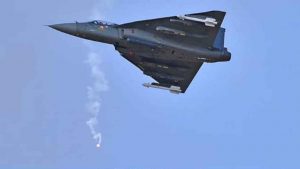 NewDelhi: India moved a step closer to getting an indigenous fighter jet for its navy with the developmental Light Combat Aircraft Naval (LCA-N) Tejas MK1 on Saturday (January 11, 2020) successfully making an arrested landing on Indian Navy aircraft carrier INS Vikramaditya.
NewDelhi: India moved a step closer to getting an indigenous fighter jet for its navy with the developmental Light Combat Aircraft Naval (LCA-N) Tejas MK1 on Saturday (January 11, 2020) successfully making an arrested landing on Indian Navy aircraft carrier INS Vikramaditya.
The important milestone proved the indigenously developed niche technologies specific to deck based fighter operations. The success will lead to India developing and manufacturing the Twin Engine Deck Based Fighter for the Indian Navy.
Fighters make arrested landings on aircraft carriers using hooks which catch the high-strength wires on the ship’s deck to help the plane in decelerating and stopping it in a limited space of about 100 metres.
Almost one-and-half month back, the naval version of LCA Tejas had achieved the feat of taking off from the Shore Based Test Facility INS Hansa, Goa armed with four missiles. The Defence Research and Development Organisation (DRDO) had on November 29, 2019, declared that the supersonic combat aircraft was carrying two Beyond Visual Range Air-to-Air missiles (BVRAAM) and two Close Combat missiles (CCM) during the successful test flight.
The missiles carried by LCA Navy were the Israeli Derby (BVRAAMs) and Russian R-73 (CCMs). Derby missile is in service with both the Indian Navy and Indian Air Force (IAF) while the R-73s also arm the combat aircraft of the latter.
INS Vikramaditya is the only aircraft carrier in service with the Indian Navy and its flying deck has ski-jumps to assist fighters take-off from the warship. Indian Navy operates the Mikoyan-Gurevich MiG-29K jets.
While the LCA-N is a single-engine aircraft, the Navy is looking at a twin-engine fighter. The test flights will give necessary data to Hindustan Aeronautics Limited to develop a twin-engine version of LCA-N.
Since landing of an aircraft on a carrier involves a higher sink rate than landing on a land-based facility, the fighter needs to have a sturdier and heavier landing gear than those used in the air force or army planes.
Leave a Reply